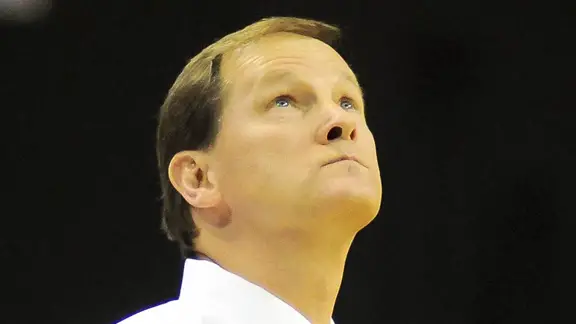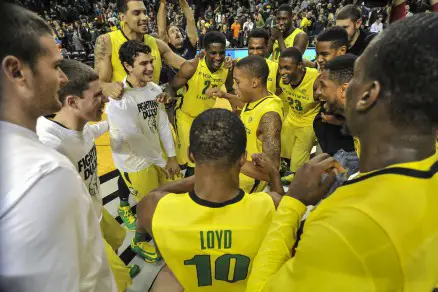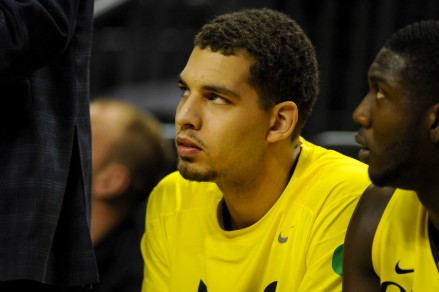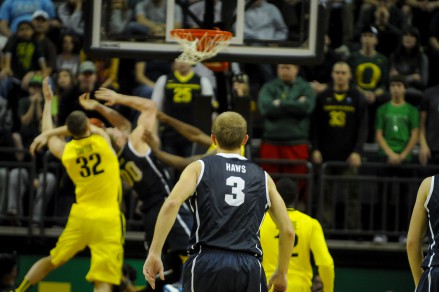Fool the Ducks once, shame on you. Several teams ‘gave their all’ in an attempt to upset the mighty Oregon Duck basketball team, but none came closer than the tenacious BYU Cougars this past weekend. In fact, in 38 minutes of gameplay, they prevailed. The Ducks got their game together at just the right time, though, and managed to force overtime where they went on to capture an 11th consecutive win. So, although several teams succeeded in making our beloved basketball team work at it, only the Cougars could provide a true test in which we seemed fooled.
But a test, or to be fooled, is just what a basketball squad like ours needs this time of year. This is the time of year where teams begin to understand their identity, potential and postseason expectations. The Ducks are a young, talented team that is experiencing the most successful start to an Oregon basketball season since ’06-’07.
Why do they need to be tested? Why not just win every game with ease and continue on to the postseason? Well, they will undoubtedly make the postseason, but the goal is to advance as high as possible when we get there. And do it without being tested at least once, is to not know how to respond.
A test is a method for in-depth evaluation. It is a means for determining the quality of something, even if that something or someone feels that they are qualified enough. The word ‘test’ has a negative connotation, usually induced by college freshman and aspiring 16-year old drivers, but it is actually a much-needed aspect of our sports society. A sports-related test should help a team determine what they need to improve on and at the same time teach them how to accomplish that goal.
After the BYU game, or BYU test I should say, Oregon will improve and tweak their game in myriad ways. Specifically, there are three changes we should keep an eye out for in the upcoming games and beyond:
Rebound, Rebound, Rebound
Oregon does their fair share at rebounding, as forward Mike Moser garners 7.5 alone, but teams such as BYU do more. On Saturday, the Cougars snatched up 51 rebounds to the Ducks’ 40. The 51 boards by BYU are one shy of a Matt Knight arena record. So, look for the Ducks to make one-of-several changes:
They will attempt to limit their opponents’ offensive rebounds. Now, obviously I’m making that sound far simpler than it really is. But O-boards can be devastating, in that they make any amount of intense defense seem superfluous when a team grabs their own rebound and puts right it back for two. The reason this is especially difficult for the Ducks to stop is because their offense revolves around transition. Although rebounds are important to any team, the Ducks’ primary focus is to get the ball out on the break. The guards aren’t going to even think about boxing out – their job is to start running. Oregon might be able to reduce offensive rebounds by limiting fast breaks, but being the 2nd-ranked team in the nation in terms of points per game, warns against that notion.
The Ducks will put in more effort to reduce offensive rebounds, as noted above, but not instead of running its transition offense. So watch Oregon simply improve their own rebounding.
Moser is trying, and Richard Amari puts in work too, but if they can get guys such as Waverly Austin to increase their numbers, it would help immensely. He may only receive around 13 minutes a game, but being 6’11” means certain duties are expected of you – one of them being rebounding. When Austin starts to really hit the boards with emphasis, we should see the total rebound numbers improve as the opponent’s rebounding number decreases.
Stop the Star
Sometimes the Ducks’ defense looks truly amazing. Whether they’re in man or zone coverage, we fans can tell if the other team is not happy. However, there are glimpses where the Ducks seem to struggle against “stars.” And in the games where stars do well, the Ducks have a tougher time at it. Most notably, we saw this both at the BYU and Ole Miss games. BYU’s Tyler Haws and Mississippi’s Marshall Henderson scored 32 and 39 points, respectively – both in overtime wars.
So the Ducks will most definitely begin to incorporate a defensive tactic to limit star power. Some teams run a box-and-one defense and some deny the star the ball, but with our dynamic defense Dana Altman will assuredly create his own method. When Oregon starts reducing the impact of opposing talent, we will see our team have an easier time getting the W.
Continue to Fight
Mirroring Duck football teams of recent years, the ’13-’14 basketball team is a second-half team. They play a close first half of basketball and then close out the opponent in the second, all the while breaking the other team’s heart. The Ducks are the man that insists you invest in his start-up company then moves to Guam. We are the team that lets you think you have a chance, then crushes you when get too close. Although this love affair is cruel and funny, it is not wise. A close game may be more entertaining for the fans, but in the grand scheme of things, only wins matter.
The Ducks will make a change involving some aspect of their first-half game. Whether that’s a change in warm-ups, earlier defensive rotations, or a different pre-game shake. Expect them to come out stronger than before. A healthy note to take from the tale of two halves, however, is that the Ducks continue to fight. They have heart, and it shows when they are down, with five minutes to go, and yet come away with a win. Even Jason Calliste acknowledges this, “It felt like we were down 50, but we just had to keep playing.” Regardless, the BYU test shows us that it would be healthier for the blood vessels of local fans if Oregon played their first half as efficiently and strong as the second. When they begin to do so, the Ducks will be even better.
Fool the Ducks once, shame on you. Fool the Ducks twice . . .. Actually, you won’t be able to fool the Ducks twice. Oregon sports are known for being dynamic, fast and ever-changing, and this year’s basketball squad is no different. They will make mistakes, they will make changes, and then they will conquer.
Top Photo by Craig Strobeck
Related Articles:
Chip Kelly Update: Everything's Good Again ...
Chip Kelly Update: Wailing and Gnashing of Teeth
Shock and Awe -- The Oregon Ducks' Football Hangover Effect
Despite Lopsided Score, Georgia State "Never Stopped Believing"
Hope Springs Eternal for Ducks
Incompetent Pac-12 Officials: How Do You Miss ALL of THIS?
Lawrence Hastings spent the first fifteen years of his life in Los Angeles, California before moving to Eugene, Oregon. Transitioning to Duck land was easy for him seeing as he was raised a Pacific Conference fan since birth. So Lawrence, loving his new green home, chose to pursue a Sports Business degree at the University of Oregon. In his spare time Lawrence plays and watches sports religiously, with a particular passion for basketball. His favorite Duck of all time is Aaron Brooks, whom he met at local basketball camp as a teenager.




